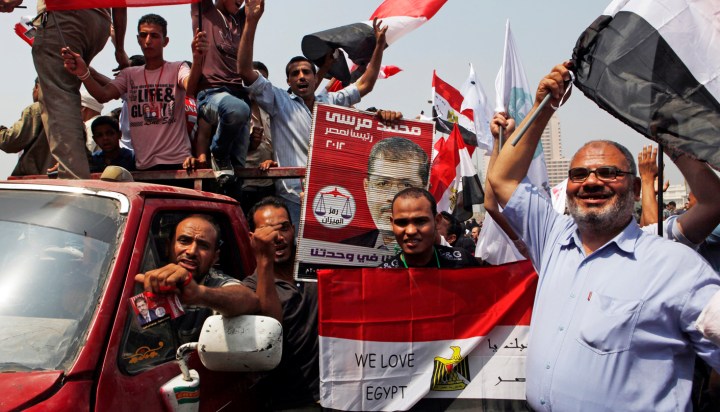Africa
What exactly is Egypt’s Muslim Brotherhood?

The Muslim Brotherhood’s early declaration of victory on Monday was followed by a declaration of victory from Ahmed Shafiq’s campaign. Official results are not due until Thursday but the possibility of the Brotherhood leading Egypt appears increasingly likely. KHADIJA PATEL delves into the history of Egypt's powerful movement.
It is not only in Egypt that a surge of Islamist political movement has gained strength. For more than a year now, the spectre of political Islam has dominated discussion of the aftermath of the “Arab Spring”. Nascent Islamist movements have been most empowered in the aftermath of the protest movements that swept through the region last year.
Yet Islamism continues to be waived about like a bogeyman spelling the death of the world as we know it. Movements like the Brotherhood have been condemned for deigning to enter the political sphere. It’s argued that an itsy-bitsy Islamist group is not what drove the spirit of Tahrir Square. The ensuing debates have proved polarising, dividing Egypt along secular and Islamist fault lines, leaving little space for nuance and even less understanding of what exactly the Brotherhood is for the rest of us.
Western perspectives have long held the Brotherhood up as an example of “radical Islamists”, deeply hostile to the United States and of course, Israel. Al-Qaeda’s Ayman al-Zawahiri, who was jailed by the president Hosni Mubarak in 1980, once sneered at the Brotherhood for “lur(ing) thousands of young Muslim men into lines for elections…instead of into the lines of jihad.”
And though the Brotherhood is often accused of being an annex of al-Qaeda, it’s driven more by a sense of “Kumbaya” than “Bomb, Bomb, Bomb”. The Brotherhood acts on the premise that Islam is not simply a religion but a way of life, concentrating first on changing the outlook of individuals, then families, and finally societies.
The movement officially rejects the use of violent means to secure its goals, but this has not always been the case. In 1948, amidst great political unrest, the Egyptian government dissolved the Brotherhood. Later that year, a number of members were implicated in the murder of the prime minister. Despite his public denunciation of the assassins, Hasan Al-Banna, the Brotherhood’s founder, was soon after assassinated himself.
When Al-Banna founded the Brotherhood 20-years earlier it was as much of an anti-imperialist movement as it was an Islamic revivalist one. They fought against the British Occupation, finding allies among the more secularly inclined, but attempts at an official alliance soon fell apart after promises to Islamise the new constitution soon proved illusory.
An embittered member of the Brotherhood’s paramilitary Special Apparatus then tried and failed to kill the president of the time, Gamal Abdul Nasser. The Brotherhood’s leaders then found themselves in prison, tortured and fighting among themselves about who exactly was “Muslim”. That debate proved the unravelling of the Brotherhood’s philosophy, its commitment to democratic ideals and the way forward.
The Mubarak years saw the Brotherhood officially banned, but tolerated. As independent candidates, various Brotherhood members pitted themselves against Mubarak in the shambles he called elections. Even in the Mubarak era of vote rigging, the Brotherhood achieved a sizeable presence in the Egyptian parliament.
After Mubarak’s fall, the young revolutionaries who stood tall against Mubarak were left dumbfounded. They had ousted Mubarak, won back their country but they had little idea of what to do next. The Muslim Brotherhood was the most organised in this vacuum.
As Egypt hailed in a new political era, the Brotherhood established its own political party – the Freedom and Justice Party – intent on keeping its overtly political ambitions separate from the work of the Brotherhood itself.
The Freedom and Justice Party, which includes a minority of Christian Copts, has gone out of its way to say it seeks a constitution that respects Muslims and non-Muslims, will not impose Islamic law and is committed to a pluralistic and democratic Egypt.
But even as the FJP stormed to a majority in parliament, many Egyptians grew disillusioned with the Brotherhood. At various times in recent months they have been accused of using deceptive “double discourse”, playing the part of sensible, moderates in English, but subversive fundamentalists in Arabic.
Many Egyptians were left nonplussed by the Brotherhood’s decision to contest the presidential election after initially declaring they would not. The Brotherhood seemed to be rivalled only by the ruling military council in its great hunger for power. Their stint in parliament has also been lambasted for being ineffectual.
As the Brotherhood now heads to battle with the ruling military council against its decision to dissolve parliament and limit presidential powers, while at the same time fighting a court case that may see the entire organisation banned once more for bureaucratic negligence, analysts have begun to question the Brotherhood’s commitment to democracy all over again.
Have they just been astute opportunists, alive to the lure of power? Is theirs really a commitment to democracy or will they go the way of the Bolsheviks, the Nazis, the Ba’ath Party in Iraq and Syria? There is little evidence of what exactly the Brotherhood will do with power – if indeed they do eventually get to it. DM
Read more:
- The Moderate Muslim Brotherhood in Foreign Affairs
Photo: Supporters of the Muslim Brotherhood’s presidential candidate Mohamed Morsy hold posters of him as they celebrate at Tahrir square in Cairo June 18, 2012. (REUTERS/Asmaa Waguih)


















 Become an Insider
Become an Insider